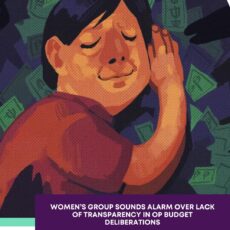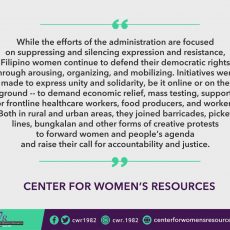Statement on International Working Women’s Day 2023
The Center for Women’s Resources joins all women worldwide in commemorating International Working Women’s Day this March 8.
Now, more than ever, women need to unite to fight for living wages, jobs, and rights amid the burgeoning economic crisis and repression brought by the continuous implementation of neoliberal policies that put capitalist profit over women’s human rights.
In the Philippines, women continue to suffer joblessness and lack of decent work and livelihood while Marcos Jr. and his cronies persistently and absurdly push to change the constitution. State repression coupled with systematic misinformation and disinformation prevails while women experience various forms of abuse and lack of access to basic social services.
Worsening crisis of precarious work
Women are employed in precarious jobs, informal labor, agriculture, and many others are forced to seek jobs overseas. Most jobs are low-skilled and low-paid. In the nine months of Marcos Jr.’s tenure, there were no concrete steps toward easing the burden of the economic crisis on women. Even the World Economic Forum’s Global Gender Gap Report recorded the sliding status of the Philippines. From #7 in 2016, it has fallen to #17 in 2021 and #19 in 2022.
One of the major reasons for the Philippines’ decline in the global gender equity index is the continued decline in women’s participation in the labor force. The condition of women worsened especially with the militaristic lockdown at the height of the COVID-19 pandemic.
The number of unemployed women increased during the pandemic in 2020 (PSA). From 852,000 unemployed in 2019, it doubled to 1.692 million in 2020. Many women workers lost their jobs because the industry they were employed in was among the first to close during the lockdown. It is estimated that there are already 2.2 million unemployed in December 2022, of which 1.065 million are women.
Many women have also lost their jobs in the manufacturing sector where most are placed in “floating status” and no compensation has been obtained because the companies’ policy is “no work, no pay”.
According to the Labor Force Survey in January 2020, women workers are mostly in the service sector: wholesale and retail industries (31.4%); accommodation and food services (6.4%); other services activities which include domestic and household help (12%).
Depreciation of wages of workers
Amid crisis and hunger, women, most of which are in precarious employment, receive very low wages. The wages received by workers, especially contractual workers, are pegged at the minimum wage, if not lower. In addition, the Gender Gap Report in 2022 states that the wages of women workers in low-skill occupations can be 50% lower than men.
Due to the rising cost of basic commodities and services, the value of the minimum wage has decreased in different regions of the country. Inflation reached 8.7% in January 2023. The real value of the set minimum wage, for example in NCR, which is P570 is only equivalent to P482. The minimum wage is even lower in regions such as BARMM and Bicol Region.
According to IBON Foundation, the P570 minimum wage (nominal) in NCR is only 49.1% of the P1,161 – Family Living Wage (FLW) or the minimum amount a family of five members needs to live decently. On the other hand, the minimum wage in BARMM is P341, which is only 17.5% of the family living wage in the region pegged at P1,944. This data shows that there is no basis for the regionalization of wages or wage differences per region due to the assumption that the price of goods and other expenses are cheaper in regions outside the NCR.
Farm workers and agricultural workers in the countryside are compensated with even lower wages for 10-12 hours of work. According to the National Wages and Productivity Commission of the Department of Labor and Employment, the current daily minimum wage rate for agriculture in areas outside the National Capital Region (NCR) is P290-390 depending on the region. However, according to the reports of women farmers, some only receive as low as P150 per day.
Attacks against unions and the right to organize
Of the total number of employed workers of over 45 million, only 4.8 million or 10.6% belong to a union or organization, association or federation of workers in the first quarter of 2022. Overall, the number of factories with unions is decreasing, but the participation of women in unions or workers’ organizations is even lower. The percentage share of women union members decreased from 14.3% in 2004 to 6.17% in 2020.
A union in Southern Tagalog reported that the National Task Force to End Local Communist Armed Conflict (NTF-ELCAC) conducts house-to-house visits among its members to force them to disaffiliate from Kilusang Mayo Uno, a progressive workers’ organization. This is a clear violation of workers’ right to organize and a blatant threat to security of workers. The situation is worse in special economic zones and export processing zones where there is a “No union, No strike” policy and non-membership of progressive organizations is made a requirement for employment.
Continued repression and human rights violations
The NTF-ELCAC continues surveillance, threats, and forced surrenders from community leaders, activists, and even ordinary citizens. Political repression against women activists, journalists, unionists, and human rights defenders have been rampant from the Duterte administration to the present Marcos Jr. administration.
In the latest record of Karapatan in November 2022, the number of political detainees reached 592 from June 2016 to June 2022 during Duterte’s administration. More than 130 of this number were women. This include Frenchie Mae Cumpio, a media worker, and Alexa Pacalda, a human rights worker. Almost ten months later, Loi Magbanua, an LGBT unionist, Elgene Mungcal of Gabriela Women’s Party and Elena Pampoza of Anakpawis remain missing. Attacks against women activists and rights workers remain rampant under Marcos Jr. There are already 17 victims of extrajudicial killings, 156 victims of enforced disappearances, a total of 9,159 displaced, and a total of 357,405 victims of harassment and intimidation.
Sign of the times: “Pag ‘di umalsa ang masa, walang tinapay sa mesa!”
During the Marcos Sr. dictatorship, women’s stance in asserting their rights during the dictatorship was historic. Even at the height of Martial Law where it is forbidden to gather and protest, more than 10,000 Filipino women took to the streets, marching to show their resistance to the ongoing tyranny and repression. During the mobilizations then, the women’s marching banner read: “Pag ‘di umalsa ang masa, walang tinapay sa mesa.”
This wordplay during the 80s has a literal translation of: “If the dough does not rise, there will be no bread on the table.” The word “masa” which means dough, also means masses or the people, and “umalsa” which means for bread to rise, also means revolt or fighting back.
At present, women, along with the different sectors of society continue to struggle for decent living wages, jobs, and rights. The current crisis presents the urgent necessity to fight for genuine land reform and national industrialization, as well as the recognition and protection of economic, social, and political rights of all sectors of society.
For women, it is important to promote equal treatment in all aspects of work and livelihood, reducing the burden of domestic work and raising children such as having real daycare so they can work; protecting against discrimination and violence, etc.
Indeed, crisis generates resistance. Women will remain at the forefront, alongside the rest of the people, to challenge the negligent, authoritarian, and imperialist- subservient Marcos-Duterte administration.
The sign of the times remain: “Pag ‘di umalsa ang masa, walang tinapay sa mesa!” #


